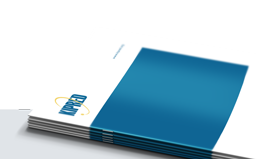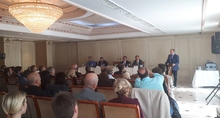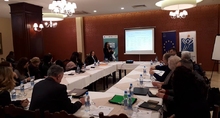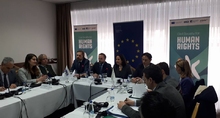The International Steering Group (ISG) departure in fact represents the bigger picture of the international community’s trajectory in the Western Balkans. While the United States’ (US) role in the region is diminishing, the EU remains divided on the status of Kosovo. In KIPRED’s latest report “The Unsupervised State: In search for international legitimacy” the authors Shpend Kursani and Ilir Deda, state that for Kosovo it is difficult to gain full international legitimacy in the framework it finds itself. Kosovo’s quest for strengthened international legitimacy is still going to depend on faltering grounds, depending on (1) Serbia’s will to cooperate, (2) the EU’s ability to measure the implementation of its conditions, especially Serbia’s actions to block and sabotage Kosovo through its five EU non recognizing partners; and it will depend on (3) the non-recognizers’ response to Commission’s recommendation on SAA.
Ilir Deda said that given that the EU is internally divided over the status of Kosovo, the most serious, if not the only, instrument the EU enjoys in relation to Kosovo is the dialogue between Prishtina and Belgrade, in return for “more EU”. According to Deda, the dialogue has also been presented to Prishtina as its only way to convince the non-EU recognizers to change their position towards Kosovo, thus making the dialogue also Prishtina’s the only instrument to obtain ‘more EU’ and naturally ‘more legitimacy’. As such, the dialogue has turned into an instrument that serves three different, and in the case of Kosovo and Serbia, opposing purposes: For the EU the dialogue seems to remain the most serious instrument on the table to tackle the issue of Kosovo’s status – assuming its accession gravity (more EU) really stimulates parties in the dialogue to compromise and agree; For Kosovo the dialogue seems to be the most probable proxy for a way out of its international half-legitimacy; and For Serbia the dialogue seems to be a strong instrument to delay Kosovo in strengthening its international legitimacy and capitalizing on the EU accession process, said Deda.
Given these challenges, Shpend Kursani said that if it is to remain stable and functional at minimum, Kosovo cannot afford to and should not count only on a dialogue: (1) in which both Kosovo and Serbia still maintain utterly opposing views and stands in terms of its outcomes; (2) in which Serbia’s current leadership is not ready and willing to compromise; (3) Which is based on an overrated ‘more EU’ policy for Serbia and a not viable one for Kosovo; and (4) in which Kosovo’s compromises are made based not on society’s potential to benefit in the long run, but on the weak and discredited leadership that is prone to easy outside pressure.
According to the authors, the institutions of Kosovo are being pushed to search for legitimacy in a rushed-in fashion of dialogue with Belgrade, while weighing against pressing domestic problems.
The report says that, Kosovo needs to diversify its strategy for attaining more international legitimacy while strengthening the state domestically by including the following elements: in relation to Serbia: Kosovo should stick to principles that the continuation of the dialogue with Serbia should begin with the complete and verified removal of parallel security structures in the north; Kosovo should condition the continuation of the dialogue with the implementation of the previously reached agreements; In the long term, Kosovo should view the “normalization” of the relations with Serbia as an instrument for a UN seat. In relation to the EU: Kosovo should invest more resources and efforts in its relations with individual EU Member States; In the medium term, Kosovo should ask the EU for credible guarantees that the dialogue with Serbia will lead to all the EU Member States to recognize Kosovo.
Download full publication here.







